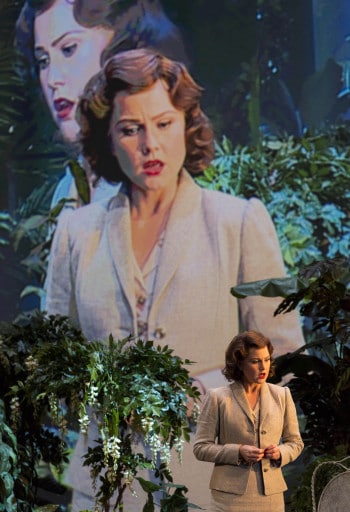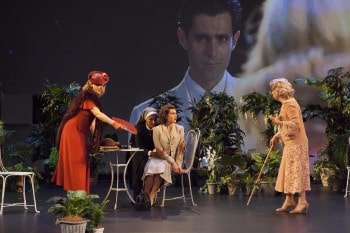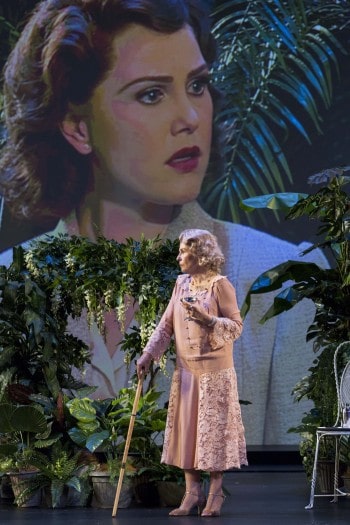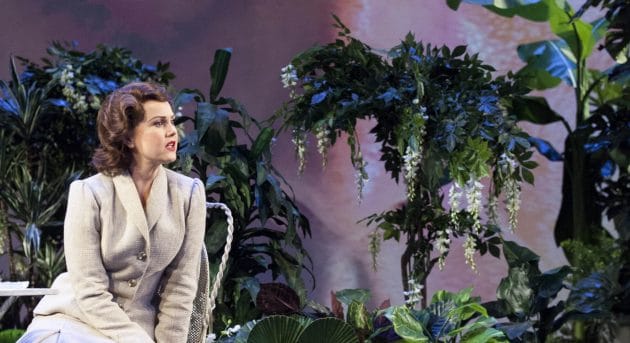Review: Suddenly Last Summer, Sydney Theatre Co
Tennessee Williams always encouraged the reach for something more in the stage directions of his plays, seeking for an elevated storytelling method and set design that would heighten and reinforce his close explorations of the humanity he best knew: the world of his family and beyond where he grew up, in the American South, writing plays from the 1930s on. Sydney Theatre Company’s production delves into that more.
Suddenly Last Summer centres on Violet Venable and her family. She meets with Dr. “Sugar” Cukrowicz to discuss the possibility of lobotomising her niece Catharine, who has been “babbling” and seems unstable; she keeps recounting a shocking story about the death last summer of Violet’s son Sebastian, and Violet simply refuses to believe it.

This is a tightly-focused, small, dramatic piece, and in Williams’ stage directions, he seeks a set that will propel the drama forward, give it grand heft. Williams wrote that the set “may be as unrealistic as the décor of a dramatic ballet… the interior is blended with a fantastic garden which is more like a tropical jungle…in the prehistoric age of giant fern-forests when living creatures had flippers turning to limbs and scales to skin.”
In 2015, what can merge the interior of a Southern gothic drawing room and a fern forest better than the deft employment of camera work? Williams and designer Alice Babidge with AV consultant Shane Johnson create a sense of uneasy reality that sits perfectly with the play’s central plot, which is the reconstruction/suppression of the memory of what happened to the late Sebastian Venable.
Camera focus wrests the argument of the truth away from his mother Violet (Robyn Nevin) and the sole witness, his cousin Catharine Holly (Eryn Jean Norvill) by refusing to be an authoritative camera entirely; it shows us Catharine’s face and Violet’s in equal measure, focusing on their inner obliteration and liberation simultaneously in the end, when the script elevates and it’s a relentless chase down the horror-filled paths of the past to get to Catharine’s revelation. You hardly notice the black-clad camera operators as they dart around stage, finding their shot.
The set design and direction is overall very successful but at first it takes a while to adjust. Violet and the Doctor cross a bare stage, backed by a white wall. They open a door hidden inside the wall, and we switch to a live feed filmed view of what’s behind the view: that garden, all verdant ferns, overhanging and creeping through every camera angle.

Later in the play, the garden is so ominous and real-seeming that it almost seems to smell – the kind of fructiferous and then the next moment rotten-sweet scent that would support the unravelling of the play toward its conclusion. Not every set can trick you into smelling something, just like not every play can use its music composition and sound design to move your heart into the throat, but in Suddenly Last Summer, Babidge and composer and sound designer Stefan Gregory do just that.
But at first it’s a struggle as we settle into the experience of the camera and its direction. This lessens the impact of some of the earlier dialogue, unmooring Violet telling the Doctor that Sebastian was searching for God from Catharine’s later comparison of Sebastian’s death as a sacrifice to a terrible God. But it still connects Violet and Sebastian’s visit to the Encantadas (now Galapagos Islands) to the final, shocking image of his death, and there’s so much to like about both Nevin and Winter in this first half hour; Nevin is a master weaver and there is so much about Violet Venable in her hands and her imperious glances that don’t falter with her physical frailty. And Winter is never passive even as he listens; the camera close-ups show is that the proverbial wheels are always turning as he listens, and tries to situate himself in the life of the Venable family and their elevated world, and there is a constant sense that he is trying to marry his own medical work (lobotomy) with the potentially catastrophic uncertainty of a new procedure. Winter’s ambiguity is skilfully played and his Doctor serves well as our introduction into the Venable world, and the world of the play as a whole.
When Catharine, her nurse Sister Felicity (Paula Arundell) and the Holly family – her mother (Susan Prior) and brother Gordon (Brandon McClelland) – arrive at the Venable estate, the set shifts and opens up, with more dynamic camera work directing us to particular characters in split-screen and close-up when necessary. These smaller parts are so vividly drawn, along with Melita Jurisic’s Mix Foxhill, attending to Violet (the cast is a wealth of talent). When everyone is accounted for and represented, something gripping, previously coiled in the play’s underbelly, starts to come apart and press forward, the camera work opens up, and the production really seems to discover and harness its innate theatricality.

Norvill is tremendous as Catharine, luminous, tremulous, beaten-down-defiant and utterly compelling. When she is given truth serum by the Doctor to determine her need for treatment and to settle Violet’s desire for the ‘real’, more palatable truth, the play soars and Norvill is the one who ensures that it does. Back against the white wall with camera-work filling in her backdrop when needed – a sketched following of Sebastian (McClelland, again) in his last journey, shown here through the bowels of backstage the Drama Theatre, a study of Violet’s face as she listens, because she must listen, the finality of splashes of red.
Norvill’s truth is underscored by Gregory’s sound design, a perfect marriage of technical design and splendid acting, because in those final moments it’s like Norvill has snatched up all the air in the room, as though she needs it to get through her story (which she barrels through like she’s powerless to control it), as though no one in the audience can breathe until it’s over. It’s an incredible experience and an affecting experience.
The strength of the last half more than makes up for the first, which is too uneven to be perfect, and actively demands more effort on concentration and acclimatisation than most plays, and Nevin, Winter and Norvill manage to anchor any technical effect and provide a constant source of energy for the audience despite that unevenness and adjustment period; the flaws of the piece are easily forgivable.
So much of this is due to Kip Williams’ central conceit and his consistently evolving direction. As Resident Director for Sydney Theatre Company, he has explored the complexity of language in plays like Macbeth and Romeo and Juliet and how to best craft these around narrative production design; his ambitious Suddenly Last Summer seems like a natural response to Macbeth’s cavernous Sydney Theatre re-design and his character-shedding, inescapably close Romeo and Juliet (also starring Norvill).
Williams champions language, bringing leaping life to monologues and soliloquies that reveal more, always more, about the character before us. His syntactic intelligence is one of his great gifts as a director, and it’s this that understanding of the form and shape of language that helps form and shape great performances and great productions. It’s why his Suddenly Last Summer is greatly and ultimately successful, even if its camerawork will be probably be loved or loathed equally.



